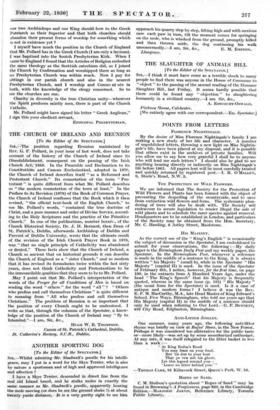THE CHURCH OF IRELAND AND REUNION
[To the Editor of the SPECTATOR.] Sii,LLThe position regarding Reunion maintained by ReV. G. F. Pollard, in- your issue of last week, does not take account of the history of the Church of Ireland since its Liisestablishment,' consequent on the passing of the Irish Chtirch Act;' 1869: In the Preamble and Declaration to its Constitutidits and Canons :,Ecclesiastieal, adopted in 1870, the Church of Ireland describes itself " as a Reformed -and ProteStant Church." Its connotation of the term " Pro- teStant " is quite different from what Mr. Pollard describes as " the modern connotation of the term at least." In the Prefade to its-Revision (1878) of the Book of Common Prayer, the Church of Ireland confesses that the Book which it then revised, "the official text-book of the English Church," to use Mr. Pollard's words, " contained the true doctrine of Christ, and a pure manner and order of Divine Service, accord- ing to the Holy Scriptures and the, practice of the Primitive Church.". In one of the publications, number Ixxxiv., of the Church Historical Society, Dr. J. H. Bernard, then Dean of St, Patrick's, Dublin, afterwards Archbishop of Dublin and Provost of Dublin University, wrote that the ultimate result of the revision of the Irish Church Prayer Book in 1878, was." that no single principle of Catholicity was abandoned or denied." These facts show that the Church of Ireland, a Church so ancient that on historical grounds it can describe the Church of England as a " sister Church," and so modern that it has revised its formularies twice within the last sixty years, does not think Catholicity and Protestantism to be the irreconcilable qualities that they seem to be to Mr. Pollard. May I point out that Mr. Pollard's interpretation of the words of the , Prayer for all Conditions of Men is based on reading the word " others "_ for the word " all "? " Others who profess and call themselves Christians " is quite different in meaning from " All who profess and call themselves Christians." The problem of Reunion is so important that the position of every cburch ought to be understood. I write so that, through the columns of the Spectator, a know- ledge of the position of the Church of Ireland may " fly to. Istambul."—I am, Sir, &c., HUGH W. B. THOMPSON.
.Canon of St. Patrick's Cathedral, Dublin. $t.. Catherine's Rectory, S.C.R., Dublin.










































 Previous page
Previous page